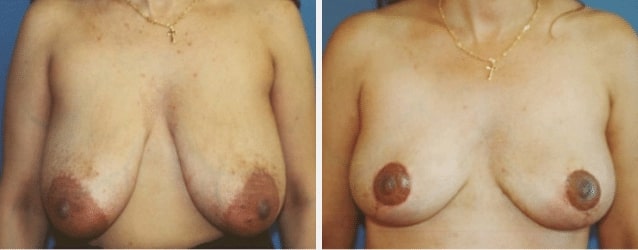What is Breast Reduction Surgery?
Large breasts can cause pain, improper posture, rashes, breathing problems, skeletal deformities, and low self-esteem. Breast reduction surgery, also known as reduction mammaplasty, is usually done to provide relief from these symptoms. Performed under general anesthesia, this procedure removes fat and glandular tissue and tightens skin to produce smaller, lighter breasts that are in a healthier proportion to the rest of the body.
What Are The Benefits of Breast Reduction Surgery?
Women with large, heavy breasts may suffer physical pain from the weight of their breasts and may experience social discomfort due to unwanted attention to their breast size. Because of this, many women turn to breast reduction as a remedy.
Large, heavy breasts can also cause strain on a woman’s body. The extra weight of heavy breasts can be harmful to posture and may lead to spinal problems. In addition to causing back, neck, and shoulder pain, excessively heavy breasts may also lead to breathing problems and other serious health issues. Breast reduction surgery can help a woman correct her posture and remove strain on the back, neck, and shoulders, reducing overall pain.
In addition to seeking relief from the pain caused by heavy breasts, many women seek breast reduction surgery because they are uncomfortable with the unwanted attention that their breast size draws. This unwanted attention may cause a woman to become uncomfortable with her appearance. Breast reduction surgery can help a woman regain her self-confidence and positive self-image, as well as provide the motivation to participate in a wide range of physical and social activities.
Breast Reduction Consultation
It is important to consider each aspect of the breast reduction procedure and your life after surgery before deciding upon the procedure. Prior to the procedure, Dr. Karp will meet with you to discuss your expectations from breast reduction surgery. At that time, he will inform you about the risks and possible complications of breast reduction surgery and the long-term effects of undergoing a breast reduction.
Breast Reduction Procedure
Breast reduction surgery generally takes a few hours, depending on the patient’s specific case, and is performed under general anesthesia most of the time.
In vertical incision short-scar breast reduction, a lollipop-shaped incision is made around the areola and down the breast. After the breast tissue and skin is removed, Dr. Karp carefully sculpts the remaining breast tissue to make sure the shape of the breast is as ideal as possible. The nipple is moved up to the appropriate location as well. The short scar breast reduction is performed by Dr. Karp in about two thirds of his patients. The operation works especially well for younger patients.
In traditional incision breast reduction, skin, fat, and tissue from the breast area are removed to reduce the mass of the breast. In most cases, the nipples are moved to a higher position on the breast, but remain attached to the nerves and blood vessels. For extremely large breasts, however, the nipples may need to be moved and grafted to a completely new location. In these situations, you will lose sensation in the nipple and areola. After the nipple is moved to its new position, the skin above the nipple is brought down and around the swell of the breast, and then stitched back to close the original incision.
Recovery From Breast Reduction Surgery
Initially after breast reduction surgery, your breasts will be sore, swollen, and bruised. You can expect to wear bandages for about two days after surgery and most patients have a drain in each breast. You can walk around within a day or two after surgery, and you can do all regular day to day activities within a week. You should also avoid heavy lifting and refrain from exercise and other strenuous activities for at least three to four weeks following the procedure. For extra support, a special soft surgical bra or athletic bra may be recommended.
Most stitches are absorbable and the rest will be removed in two to three weeks after the breast reduction procedure. Most women will be able to return to work and other normal activities about one week after undergoing a breast reduction. To ensure that the breasts are healing properly, breast reduction patients should attend follow-up appointments for several months after surgery.
What Are The Risks and Complications of Breast Reduction Surgery?
Dr. Karp performs breast reduction surgery with great care and precision, ensuring safe results that meets the expectations of their patients. As with all surgeries, however, complications can occur. Potential risks that are specific to breast reduction will be discussed with you at your consultation.

